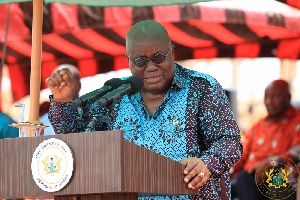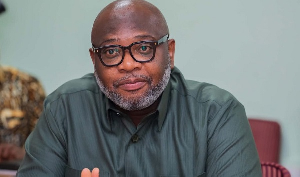Out of the 146,968 applicants who successfully completed and submitted their applications to join the Nation Builders’ Corps (NaBCo), 94,863 have scheduled their interviews as of yesterday.
Gender breakdown of applications
Females constitute 55,964, representing 38.22%, while 90,454, representing 61.78%, are males.
Breakdown of type of qualification of NaBCo applicants
Out of the 146,968 applicants who successfully completed and submitted their applications, 54,012, representing 36.75%, are degree holders; 66,616, representing 45.33%, hold diploma while 26,340 applicants, representing 17.92%, are certificate holders.
Educate Ghana attracted highest application
Educate Ghana topped the applications with 43,834, representing 30.202%. It is followed by Revenue Ghana, with 31,095, representing 21.425% of all applications.
The others are Civic Ghana - 19,917 (13.723%); Digitise Ghana - 16,620 (11.451%); Enterprise Ghana - 12,949 (8.922%); Heal Ghana - 11,785 (8.120%); and Feed Ghana - 8,934 (6.156%).
Regional breakdown of applications
The regional breakdown of applications include Ashanti - 34,909 (24.05%); Greater Accra - 31,809 (21.92); Northern - 19,807 (13.65%); Brong Ahafo - 12,248 (8.44%); and Central - 11,139 (7.68%).
The rest are Eastern Region - 11,039 (7.61%); Western - 10,070 (6.94%); Volta - 5,347 (3.68%); Upper East - 4,756 (3.28%); and Upper West - 4,000 (2.76%).
Dates for interviews
Interviews would be conducted in all districts from July 18 to 25, 2018.
Orientation takes place July 30 to August 3
Orientation for the selected 100,000 successful applicants would take place at the district level from July 30 to August 3, 2018.
Membership of interview panel
In every district, a panel of five will consist of a representative of the district assembly, a member of the NaBCo Secretariat, an official from National Service Secretariat, a representative from a module implementation partner, and a representative from the Ministry of Employment and Labour Relations.
In all cases, applicants will be validated and processed through the interview.
Successful applicants
If successful, an applicant will receive a text notification within three days of the interview.
The notification will advise on the next steps, including how to print the engagement letter from the web portal.
Orientation
Once successful applicants submit their letters to the district of placement, they will be processed to commence a five-day orientation. In all districts, the dates for NaBCo orientation are from July 30 to August 3, 2018.
This shall include a military component on resilience, endurance, positive attitude, discipline and responsibility.
Passing-out ceremony
Once orientation is over, the successful trainees will all converge at their respective regional capital for a passing-out ceremony.
Placement of recruits
From August 6, 2018, trainees are expected to commence their placement in their chosen module within the organisations and enterprises they have been placed.
Each trainee will be given a three-year contract under a work-and-learning arrangement.
For every four weeks of work, one week will be dedicated to skills development and training.
This results in a cumulative 12-week worth of core training, in addition to the on-the-job training every year.
16,000 Duplicates identified
Out of the 146,968 applicants, it has been identified that about 16,000 duplicates have been deleted from the system.
Managers have assured that all successful applicants would be interviewed. Even though this is a difficult task, managers believe it would test the readiness of the applicants and help them to build it for future job interviews.
The over 30,000 applicants that may not be placed would opt to be put on a waiting list and will be the first to replace those that may drift out of the programme.
While the form is easy to complete, a lot of applicants struggled with writing personal statements due to factors such as poor skills, approach to job search, lack of confidence, and inability to prepare good curriculum vitae (CV).
General News of Monday, 11 June 2018
Source: thefinderonline.com













